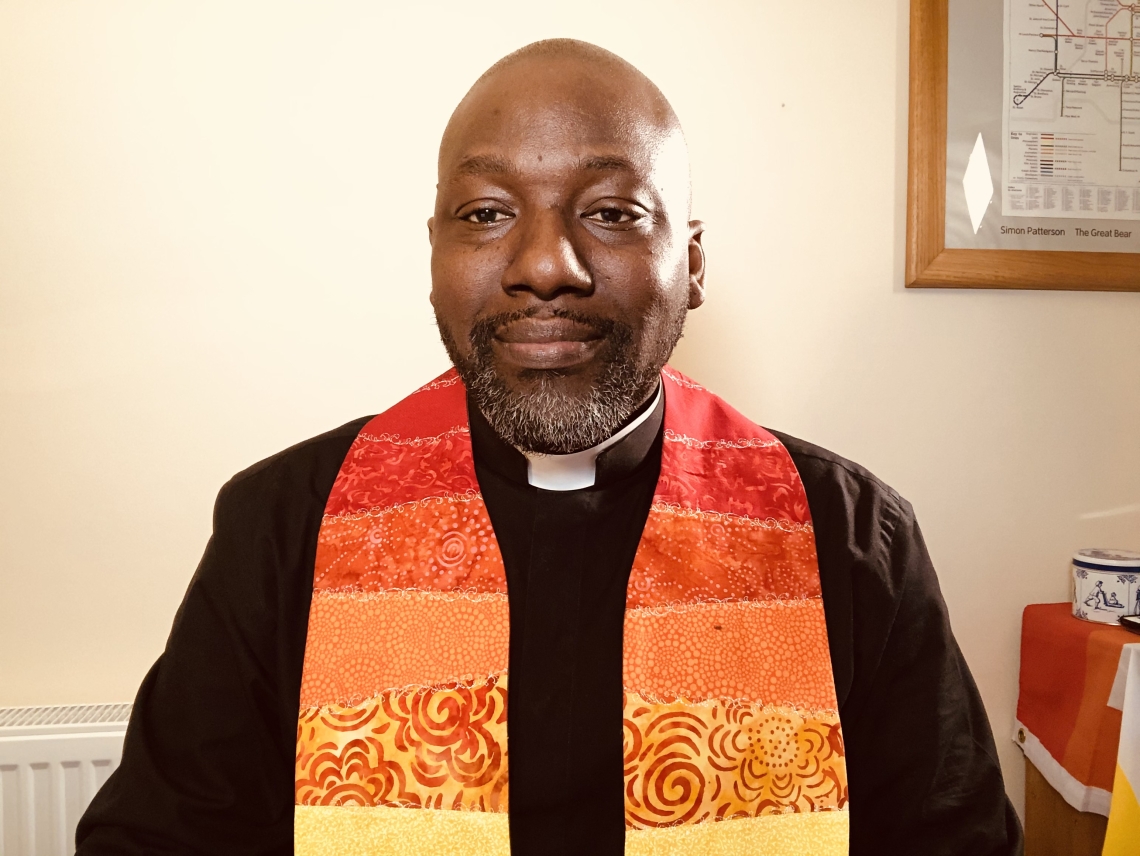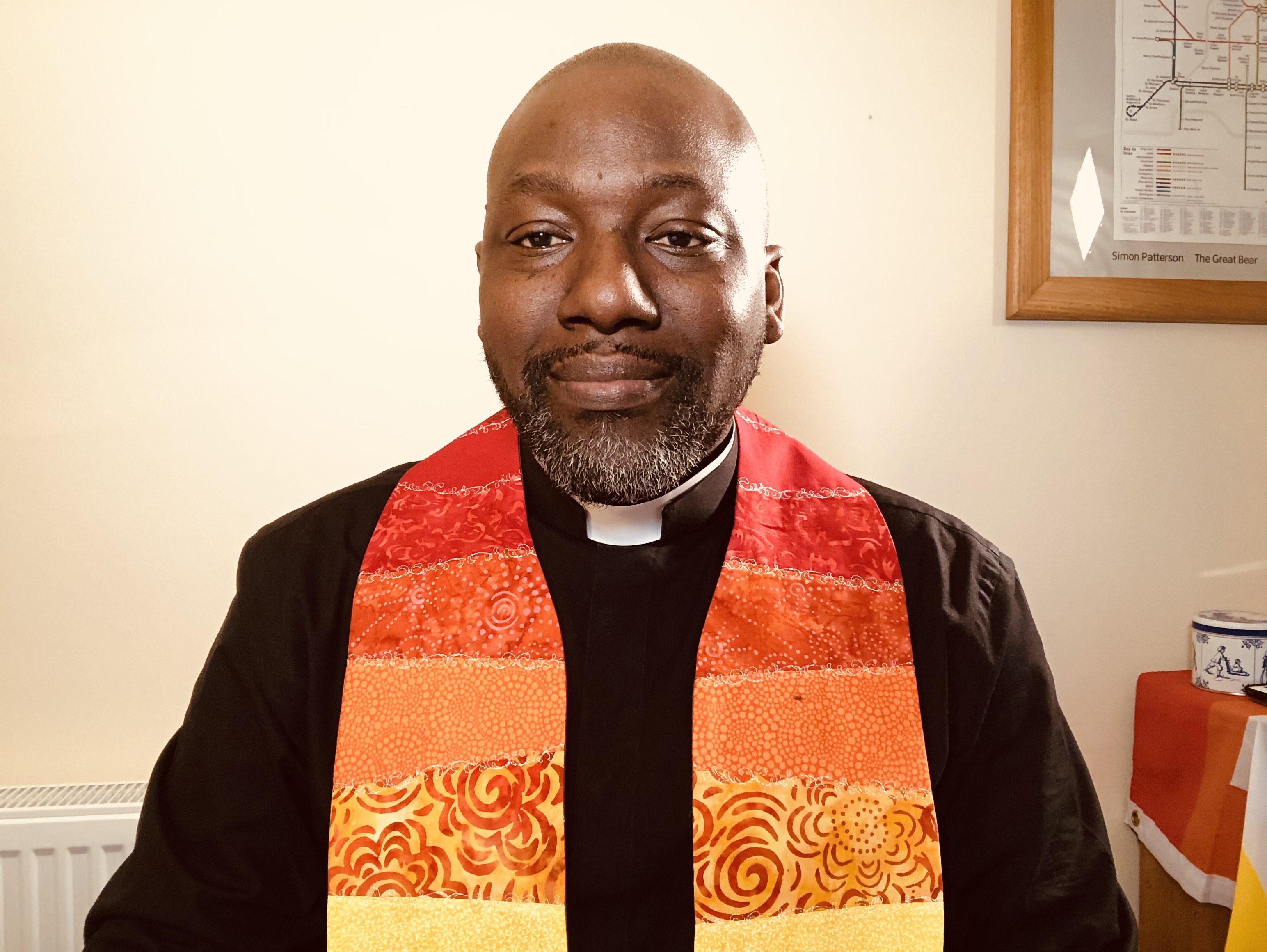Black History Month: Interview with Reverend Jide Macaulay

Reverend Jide Macaulay (he/him) is the Founder and CEO of House of Rainbow CIC. Openly gay British Nigerian born in London, he is a Christian minister since 1998, an Anglican Priest and inspirational speaker, author, poet, pastor and preacher and a HIV Positive activist. Jide holds a degree in Law, master’s degree in Theology and Post-graduate certificate in Pastoral Theology.
Jide is also the chairperson for the One Voice Network an independent collective of Black-led community organisations and allies, seeking to improve the health and wellbeing of Black communities in the UK who are affected by HIV. National AIDS Trust works alongside the One Voice Network on the Unheard Voices project, which centres Black people living with or at risk of HIV in conversations about their health services.
What do you think Black communities living with HIV need to thrive in the UK?
The Black community in the UK is an integral part of British society, encompassing migrants, asylum seekers, and long-standing members. However, this community has endured significant hardships stemming from prejudice, racism, and xenophobia.
To foster thriving communities, we must foster both internal and external support. It's essential for all of us to understand how to promote the well-being of Black individuals in our nation. When it comes to HIV, Black communities often face barriers to testing and accessing resources like PrEP and PEP. Routine testing should be encouraged without the need for prompting, avoiding serious situations.
To truly thrive, we must create more inclusive spaces for diverse communities to coexist. A non-judgmental and non-discriminatory atmosphere within the Black community can serve as a model for flourishing in any societal context, especially in the UK.
What role does your faith play in the activism you do around HIV?
Faith plays a significant role in my advocacy for HIV awareness. Unfortunately, faith has sometimes been misused, with claims that it can replace medication for those living with HIV. My mission is to ensure that individuals can access their medication regardless of their faith or religious beliefs, emphasising the importance of combining scientific knowledge with faith.
I vividly recall the day I received my HIV diagnosis. In my anguish, I prayed and questioned why it happened to me. Yet, I also felt gratitude for the medical advancements that have made managing HIV as simple as taking a single daily tablet, which is now a minor concern in my life.
In tandem with my faith, I have been empowered to achieve remarkable milestones post-diagnosis. Prior to my diagnosis, I had not embarked on the path to becoming a priest in the Church of England. Since then, I have earned two university degrees and made significant contributions to various charitable organisations. I've taken on the role of an HIV mentor in multiple communities, driven by my faith to create safe spaces and bring about peace, not only within the church but in society as a whole. I take pride in being an openly gay priest who is HIV positive and remain steadfast in my commitment to this cause.
How do you think you have grown since you first got involved within HIV activism? And what lessons did you learn/would you pass on to others?
Over the past two decades since my diagnosis, I've experienced significant personal growth, marked by numerous highs and lows. One of the key challenges in this journey has been the issue of disclosure – deciding whom to inform about my HIV status and for what reasons. Today, I advocate for disclosure on a case-by-case basis. It's essential to share our HIV status with those who genuinely care about us because they will offer the support we need. However, there are circumstances where non-disclosure is the prudent choice, particularly in environments hostile to HIV-positive individuals, where disclosure could jeopardise one's job, housing, or family relationships. My own growth process was prolonged because I didn't find peer support until six years after my HIV diagnosis. I hope that when people receive their diagnosis, they are immediately connected with supportive communities to help them navigate their journey. True growth began for me when I discovered a supportive community and started creating safe spaces, even within my organisation, House of Rainbow. As the chair of One Voice Network, I remain dedicated to promoting the importance of these safe spaces. Furthermore, personal growth involves challenging self-stigma, self-shame, self-denial, and self-discrimination, as no one else can stigmatise you if you haven't already internalised it.
How can local and national government, as well as health systems, support Black communities living with HIV?
The inception of the One Voice Network stemmed from the recognition of a dire lack of support and visibility for the needs of Black communities, particularly those organisations addressing HIV services. Additionally, the challenge of limited or insufficient funding further hampers the promotion of these crucial services.
I would urge the Government to acknowledge the profound impact of effective services within the Black community. This isn't about showing favoritism but rather about elevating standards to facilitate targeted HIV awareness campaigns. HIV prevention not only benefits the health of the Black community but also the overall well-being of the NHS. It's essential to prevent a situation where a significant portion of the Black community ends up in A&E with advanced HIV or AIDS.
Having volunteered as a chaplain at Mildmay Hospital, a specialised HIV treatment centre, I've witnessed that many individuals diagnosed late are from predominantly Black boroughs in London. This is a painful reality that we must address.
Furthermore, it's crucial for NHS practitioners to receive comprehensive training in diversity and an understanding of the unique needs of the Black community. On a local level, we must develop culturally sensitive approaches to healthcare. Normalising conversations about HIV is paramount, and the One Voice Network aims to achieve this by raising awareness and sensitising our communities, from the grassroots level to healthcare services and government agencies.


